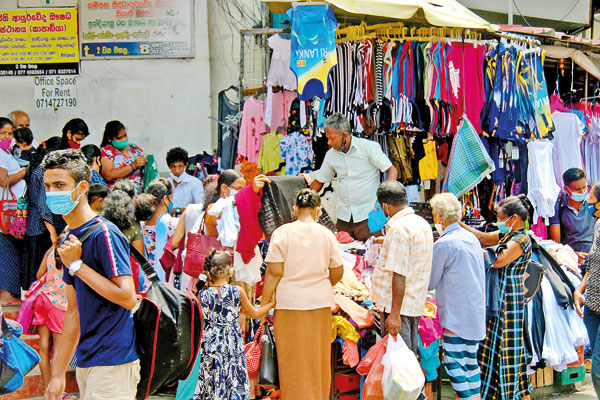News
“Act with responsibility”, public told
A strong call went out once again for everyone to be extra careful and take the basic preventive measures against COVID-19 as the week of the New Year celebrations dawned.
Expressing concern about crowds gathering in many places for shopping, Health Promotion Bureau Director, Dr. Palitha Karunapema, told a media briefing that even though the country is seeing a decline in the COVID-19 infections and there is control of the disease, avadanama (risk) has not reduced.
“Safeguard yourself and your family by not going to crowded places and when you have to leave home wash your hands frequently, wear a face-mask and keep a distance from others,” he said.

Avurudu shoppers in Pettah yesterday. Pic by Reka Tharanganie
The same sentiments were echoed by the Deputy Director-General (Public Health Services I), Dr. S.M. Arnold who sought people’s support to prevent another COVID-19 wave striking the country.
Picking up the guidelines issued by the Director-General of Health Services with regard to celebrating the New Year in a safe manner, he said these guidelines are meant to make people aware about what behaviour would prevent the spread of disease during the festivities. They have been issued under the Quarantine and Prevention of Diseases Ordinance and if anyone flouts them, they can face legal action.
“People may think it is just a guideline, but it has legal teeth. Limit numbers at celebrations and both organizers and participants in the festivities should ensure that the guidelines are followed,” said Dr. Arnold, adding that health officials are unhappy about large crowds gathering when shopping etc. which is kohomathma honda ne (not good at all).
He said that the health authorities alone cannot prevent the spread of COVID-19 and sought public support.
“Act with responsibility,” urged the DDG, appealing to people to prevent large infections occurring two-three weeks after the New Year. It is better to prevent it. “Otherwise, we may regrettably have to say, ‘We told you so’!”
He added that there is a drop in infections due to control measures and public support, but if safeguards are loosened, there will be a rise in numbers. There is collective responsibility to prevent this. Uthsava samaya avadanam kalayak (The festive season could become a risky time for the spread of COVID-19).
| Slight rise in numbers due to Jaffna cluster There were 221 COVID-19 positive patients on Wednesday, while on Tuesday the number was 177, said Chief Epidemiologist, Dr. Sudath Samaraweera, stressing that people should not be alarmed over this “slight increase” as they were found among the first contacts in the Jaffna cluster who are in home quarantine and not in the community. “This may be a trend we see for some time in the Jaffna cluster as we continue to perform RT-PCR tests on the contacts,” he told the media on Thursday. All these people are in home quarantine, so there is no danger of a spread of COVID-19, added Dr. Samaraweera.
| |
| Quarantining guidelines for returning Sri Lankan children With confusion over the quarantining procedure for vaccinated Sri Lankans returning to the country with unvaccinated children, the Sunday Times found the following guidelines issued by the Director-General of Health Services on April 6. Currently many countries are not vaccinating children below 18 years as the vaccines have not been tested on them yet. Quarantine measures for ‘fully-vaccinated’ Lankan travellers If there are any children below 12 years, they can be discharged with fully-vaccinated travellers by adhering to the following measures:
If a fully- vaccinated adult enters a Quarantine Hotel/Centre/Safe and Secure Certified Level 1 Hotel after arriving in Sri Lanka as a caretaker of a child or an adult, that person should remain in the Quarantine Hotel/Centre/Safe and Secure Certified Level 1 Hotel until the quarantine period of the care recipient (child or adult) is completed. A fully-vaccinated caretaker of a child or an adult who is eligible for exemption of quarantine will not be subjected to exit PCR testing, unless they have symptoms or the person cared for (child or adult) becomes positive/asymptomatic. |


